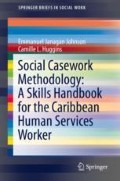Abstract
In this chapter, when working in the Caribbean there should be a theoretical framework that best works with vulnerable and disenfranchised populations such as, those living in extreme poverty. The theories should be anti-oppressive and social justice-oriented frameworks such as; resiliency theory, intersectionality, and cultural humility.
Access this chapter
Tax calculation will be finalised at checkout
Purchases are for personal use only
References
Crenshaw, K. (1991). Mapping the margins: Intersectionality, identity politics and violence against women of color. Stanford Law Review, 43(3), 1241–1299. http://www.jstor.org/stable/1229039.
Freire, P. (1972). Pedagogy of the oppressed. New York: Herder & Herder.
Fook, J. (1993). Radical casework: A theory of practice. Australia: Allen & Unwin.
Hook, J. N., Davis, D. E., Owen, J., Worthington, E. L., Jr., & Utsey, S. O. (2013). Cultural humility: Measuring openness to culturally diverse clients. Journal of Counseling Psychology, 60, 353–366. https://doi.org/10.1037/a0032595.
Luthar, S. Cicchetti, D., Becker, B. (2003). The construction of Resilience: A critical evaluation and guidelines for future work. Child Development, 71, 543–562. https://doi.org/10.1111/1467-8624.00164.
Rutter, M. (2012). Special section article resilience as a dynamic concept. Development and Psychopathology, 24(2012), 335–344. # Cambridge University Press. https://doi.org/10.1017/S0954579412000028.
Smith-Osborne, A. (2007). Life span and resiliency theory: A critical review. Advances in Social Work, 8(1), 152–168.
Tervalon, M., & Murray-García, J. (1998). Cultural humility versus cultural competence: A critical distinction in defining physician training outcome in multicultural education. Journal Health Care Poor Underserved, 9(2), 117–125.
Ungar, M. (2004). Nurturing hidden resilience in troubled youth. Toronto: University of Toronto Press.
Veenstra, G. (2012). The gendered nature of discriminatory experiences by race, class, and sexuality: A comparison of intersectionality theory and the subordinate male target hypothesis. Sex Roles, 68, 646–659. https://doi.org/10.1007/s11199-012-0243-2.
Walker, A. (1983). If the present looks like the past, what does the future look like? (1982). In Search of our mothers’ gardens. 290: 290–91.
Author information
Authors and Affiliations
Rights and permissions
Copyright information
© 2019 The Author(s), under exclusive license to Springer Nature Switzerland AG
About this chapter
Cite this chapter
Johnson, E.J., Huggins, C.L. (2019). Theoretical Underpinnings Needed for the Caribbean. In: Social Casework Methodology: A Skills Handbook for the Caribbean Human Services Worker. SpringerBriefs in Social Work. Springer, Cham. https://doi.org/10.1007/978-3-030-27319-4_5
Download citation
DOI: https://doi.org/10.1007/978-3-030-27319-4_5
Published:
Publisher Name: Springer, Cham
Print ISBN: 978-3-030-27318-7
Online ISBN: 978-3-030-27319-4
eBook Packages: Behavioral Science and PsychologyBehavioral Science and Psychology (R0)

